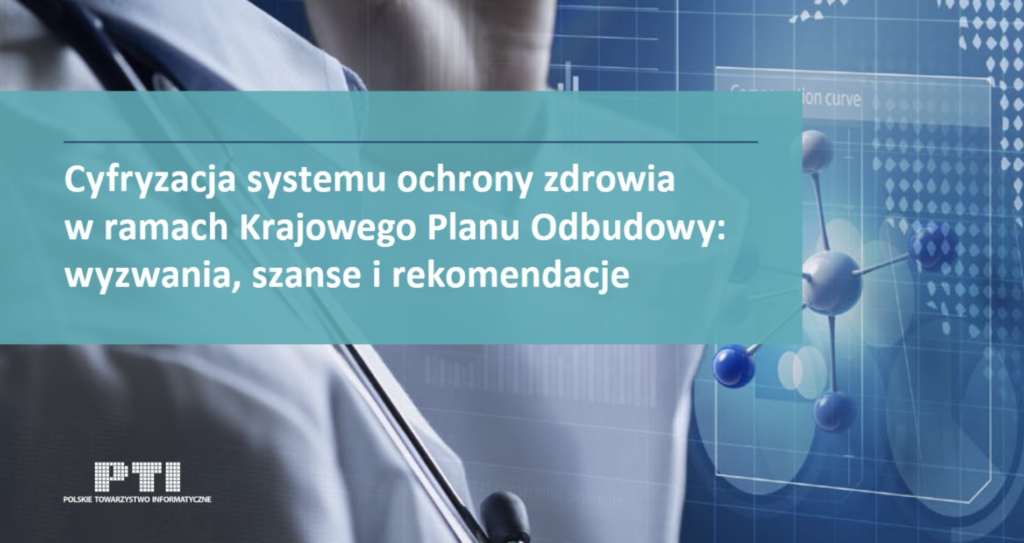
Final Version of Study on Digitalization of Healthcare in Poland Now Available
We are pleased to announce that the final version of the study "Digitalization of the Healthcare System in Poland as part of the National Recovery Plan: Challenges, Opportunities, and Recommendations" is now available in Polish.
The study was prepared by the team from the Polish Information Processing Society (PTI) and Sano Centre for Computational Medicine – International Research Foundation. Team members included Wiesław Paluszyński (PTI), Marian Bubak (PTI/Sano Centre), Piotr Darwaj (PTI), Rafał Niżankowski (Sano Centre), Piotr Pietrzak (PTI), and Dominik Radziszowski (Sano Centre). Collaboration partners for this study were NIL IN – National Chamber of Physicians – Network of Innovator Physicians, and PAMTEC – Empowering MedTech Innovators in CEE.
You can access the complete document on the Polish Information Processing Society (PTI) website at this link https://pti.org.pl/cyfryzacja-systemu-ochrony-zdrowia-w-ramach-krajowego-planu-odbudowy-wyzwania-szanse-i-rekomendacje/. This publication provides an in-depth look at the transformative potential of digitalization in enhancing Poland’s healthcare services.
“Digitalization of the healthcare system in Poland as part of the National Recovery Plan: challenges, opportunities and recommendations
January 2025
The team of the Polish Information Processing Society and the Sano Center for Computational Medicine International Research Foundation have prepared a study aimed at increasing the rational use of the National Recovery Plan (KPO) funds for the digitalization of the healthcare system in Poland. The study is addressed to all stakeholders involved in planning and implementing projects to digitalize this system, both at the central level and by individual hospitals.
Rational use of KPO funds is a unique opportunity to improve the quality of healthcare for the benefit of citizens and medical professionals, make a technological leap, use the latest, proven IT technologies, reduce technological debt, and create a multi-year plan for the implementation of innovative IT solutions in the healthcare sector in Poland, preparing it for the era of computer-assisted medicine using the idea of a virtual human twin, while stimulating the economy of new medical technologies.
The study is based on the needs of the healthcare service in Poland and the general goals of digitalization presented in the National Digitalization Strategy. In this context, an analysis was carried out of the challenges facing the transformation of the healthcare service in Poland within the KPO, taking into account the limitations resulting from the KPO program and the decisions already made on its implementation.
Key 6 challenges identified by the team:
Tight implementation timeline – Limited time for executing investments under KPO funding.
High complexity – Large-scale and intricate nature of activities.
Diverse procedures and IT systems – Variability in processes and technologies, including cybersecurity concerns.
Lack of early-stage support for innovation – Insufficient backing for projects in the initial development phase.
Vague quality measures – Poorly defined criteria for evaluating planned activities.
Technology-centric focus – Risk of prioritizing technological aspects over real benefits for doctors and patients.
The fundamental response to these challenges is the recommendation to introduce an efficient, comprehensive management model, the key element of which is the creation of a Portfolio/Project Management Office (PMO) operating at the operational and technical level, subordinate to the Minister of Health, whose tasks would also include defining the responsibilities of the participants in this digitalization and managing the specifications of the IT architecture.
A significant part of the study consists of recommendations for three key categories of entities involved in the implementation of the project.
7 key recommendations
- Building a “no-blame” culture that allows medical personnel to openly report and analyse events without fear of reprisals, ,
- Creating clinical registers supporting the collection of reliable medical data in accordance with the EHDS principles,
- Systemic quality improvement,
- Developing stakeholder-oriented indicators of the impact of KPO investments on achieving the assumed goals of sector digitisation,
- Simplifying approach, a.o. by reducing the number of parallel implementations in hospitals,
- Applying a standardising approach in management, process and technology aspects to achieve economies of scale both on the part of the ordering party (MZ/CeZ) and hundreds of hospitals,
- methods of managing the modernisation of IT solutions and cybersecurity.
Strategic directions for digital transformation
Hospitals: Develop clear digitization strategies, optimize resource use, ensure high-quality implementation, and streamline projects for cost efficiency.
Medical innovators: Tackle technological, regulatory, and operational challenges while fostering collaboration with end users and improving project planning.
IT solutions: Focus on selecting the right system architecture, modernizing and integrating data, and building scalable, secure, and interoperable applications.
The final part of the study presents a proposal of actions necessary so that after the end of financing by KPO, the created healthcare IT system can be developed in a thoughtful way, taking into account the requirements of doctors, hospitals, patients and the system for assessing the quality of medical procedures.
The partners of the study are: NIL IN – Supreme Medical Chamber – Network of Physicians Innovators, PAMTEC – Empowering MedTech Innovators in CEE; the document uses the results of a survey conducted among 50 Polish entities, innovators of the medical industry.”





